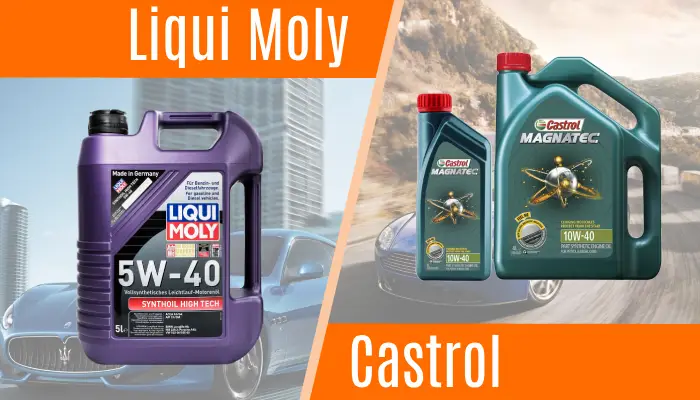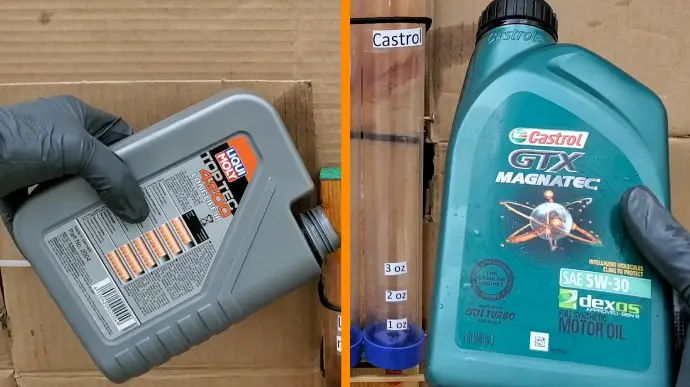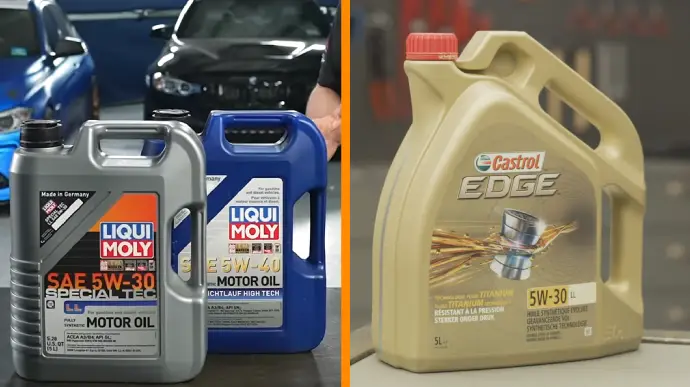Physical Address
304 North Cardinal St.
Dorchester Center, MA 02124
Physical Address
304 North Cardinal St.
Dorchester Center, MA 02124

When selecting the ideal engine lubricant for your vehicle, two prominent brands often stand out: Liqui Moly and Castrol. Both offer a range of synthetic oils designed to optimize engine performance and longevity. However, there are significant differences between the two that can influence your choice.
Liqui Moly offers an extended oil change interval of up to 25,000 miles with an operating temperature range of -20°C to 140°C. Conversely, Castrol recommends oil change intervals of up to 15,000 miles with an operating temperature range of -35°C to 150°C.
Also, there are several differences between these engine oils. As part of this article, we’ll explore the main differences between these two engine oils and explain which is most suitable for your needs. So continue reading.

When comparing Liqui Moly and Castrol engine oils for vehicles, several key differences exist.
Liqui Moly offers several synthetic oil options with 5W-30, 5W-40, and many more viscosity grades. These grades provide versatility for different engines, ensuring optimal lubrication and protection.
On the other hand, Castrol provides a broader range of viscosity options, including 0W-20, 0W-30, and 0W-40. These options cater to various vehicles and engine types, offering greater flexibility in choosing the right oil for specific needs.
Liqui Moly offers a longer oil change interval of up to 25,000 miles, appealing to those who want to reduce maintenance frequency and costs while maintaining excellent engine protection. The advanced technology and high-quality additives in Liqui Moly’s engine oil formulation make this longer interval possible.
Alternatively, Castrol recommends frequent oil changes of up to 15,000 miles, balancing performance and maintenance. This interval is suitable for drivers who prefer a moderate maintenance schedule but still want to ensure their engines are adequately protected.
Liqui Moly offers an operating temperature range of -20°C to 140°C, which allows it to regulate engine temperatures and keep them lower effectively. This makes it an excellent choice for individuals driving in diverse climates, as it can handle various temperature conditions.
On the other hand, Castrol boasts an impressive operating temperature range of -35°C to 150°C. This range makes it a preferred option for extreme temperatures where the engine may be subjected to very low or very high temperatures.
Castrol, known for its high-mileage performance, prevents sludge formation, maintains oil cleanliness, and protects against rust and corrosion. This makes it a preferred choice for older vehicles, as it helps prolong the engine’s lifespan.
Alternatively, Liqui Moly offers excellent engine protection and extended oil change intervals. While it may not have the same emphasis on high-mileage performance as Castrol, it still provides reliable protection for your engine.
Castrol incorporates a zinc compound (ZDDP) in its engine oils, providing strong engine protection and reducing wear and tear. However, Castrol doesn’t offer a wide variety of oil additives, limiting its ability to address specific performance needs.
Meanwhile, Liqui Moly offers approximately 29 different oil additives, allowing precise fine-tuning of your oil to meet your vehicle’s requirements. These additives enhance engine performance and protection, providing flexibility and customization options.
Liqui Moly has built a reputation for its versatility, compatible with vehicles such as BMWs, Jeeps, bikes, and heavy-duty trucks. This makes it a convenient choice for drivers with multiple vehicles or a diverse fleet.
Conversely, Castrol is compatible with automobiles, light trucks, and motorcycles. However, regarding specific compatibility with certain vehicle brands, Liqui Moly may have an edge.
Liqui Moly is known for its exceptional ability to reduce engine noise and provide a smoother engine experience. If you’re sensitive to noise and vibrations, Liqui Moly’s performance may be more appealing to you.
Nevertheless, while Castrol offers a comfortable engine experience, it may not prioritize noise reduction and smoothness to the same extent as Liqui Moly. Therefore, if you value a quieter and smoother engine operation, Liqui Moly may be your better choice.
Liqui Moly is highly regarded for its commitment to being environmentally friendly. It’s known for its eco-conscious choices, making it an appealing option for those who value sustainability.
However, while Castrol also considers environmental factors, it may not prioritize them as prominently as Liqui Moly. Therefore, if eco-friendliness is important, Liqui Moly is the brand to consider for your vehicle’s engine oil.
Liqui Moly’s unique stickiness attribute provides effective lubrication even in colder conditions, making it particularly beneficial for regions with harsh winters. This stickiness ensures the oil adheres to engine components, reducing wear and tear during the crucial cold start phase.
Conversely, Castrol’s performance in cold start conditions is reliable, although it may not offer the same level of stickiness as Liqui Moly. Therefore, if you live in extremely cold areas, Liqui Moly engine oil may be the preferred choice to ensure optimal cold start behavior and engine protection.
If you’re looking for a more affordable option, Castrol may be the better choice. Generally, Liqui Moly engine oils are priced lower than Castrol. However, note that the cost of engine oil can vary depending on the specific product, your vehicle type, and your driving preference.
Here’s a comparison table highlighting the key differences between Liqui Moly & Castrol engine oils:
| Aspect | Liqui Moly Engine Oil | Castrol Engine Oil |
| Viscosity Grades and Options | 5W-30, 5W-40 and more | 0W-20, 0W-30, 0W-40, and more |
| Oil Change Intervals | Up to 25,000 miles | Up to 15,000 miles |
| Operating Temperature Range | -20°C to 140°C | -35°C to 150°C |
| Price and Budget Considerations | Generally more affordable | Generally more expensive |
| Engine Protection and Additives | Offers various oil additives | Contains zinc compound (ZDDP) for protection |
| Environmental Friendliness | Praised for being environmentally friendly | Environmental considerations |
| Stickiness and Cold Start | Sticky, aids cold start behavior | Reliable in cold start conditions |
| High-Mileage Performance | Excellent engine protection | Favored for high-mileage performance |
| Lasting Power vs. Performance | Extended engine protection | Exceptional performance in high temperatures |
| Engine Noise and Smooth Operation | Reduces engine noise, smoother operation | Provides smooth operation |
The effectiveness of Liqui Moly and Castrol for high-mileage vehicles can be assessed by evaluating their performance in preventing sludge formation, maintaining oil cleanliness, and protecting against rust and corrosion.
Castrol is often preferred for high-mileage vehicles due to its ability to extend the life of older engines. It’s specially formulated to prevent the buildup of sludge, which can impede engine performance and cause damage over time.
Castrol also excels in maintaining oil cleanliness, ensuring that contaminants are effectively suspended and removed from the engine. Additionally, Castrol’s formulation provides superior protection against rust and corrosion, important for high-mileage vehicles that may have been exposed to harsh conditions.

When considering the suitability of Liqui Moly and Castrol for all types of vehicles, note their compatibility with a wide range of vehicle brands, making them versatile options for many drivers. Both Liqui Moly and Castrol offer engine oils suitable for gasoline and diesel-powered vehicles.
Liqui Moly has developed a reputation for its high-quality oils that meet the needs of various vehicle types, including cars, motorcycles, and trucks. Alternatively, Castrol is known for its extensive range of oils compatible with numerous vehicle brands, making it a popular choice among drivers.
Whether you own a sedan, SUV, or even a high-performance sports car, both Liqui Moly and Castrol provide options that can meet the specific requirements of your vehicle, ensuring optimal engine performance and protection.
You shouldn’t mix Liqui Moly and Castrol engine oil due to potential compatibility issues and the risk of not getting the intended benefits of either brand.
Engine oils are formulated specifically to meet the requirements of different engines and vehicles. Mixing two different brands can disrupt the balance of additives and viscosity, leading to reduced performance and potential engine damage.
Liqui Moly and Castrol have unique formulations and additives designed to provide optimal lubrication and protection for specific engine types. Mixing them can result in a diluted oil mixture that may not offer the same level of performance and protection.
Choosing between Liqui Moly and Castrol engine oils boils down to your specific needs, vehicle type, budget, and environmental conditions.
Liqui Moly excels in extended oil change intervals, lower engine temperatures, and an array of oil additives, while Castrol provides a budget-friendly option, a broader operating temperature range, and an edge in engine protection.
Consider these differences carefully to select the engine oil that best suits your vehicle and driving conditions. We hope after reading this in-depth article you can make a wise choice about which engine oil brand is right for you.
Last update on 2025-07-18 / Affiliate links / Images from Amazon Product Advertising API